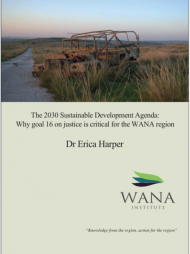-
The 2030 Sustainable Development Agenda: Why goal 16 on ...
The 2030 Sustainable Development Agenda: Why goal 16 on justice is critical for the WANA region
On 27 September 2015, a high-level plenary meeting of the United Nations General Assembly adopted 17 Sustainable Development Goals (SDGs) — the culmination of a 3-year process aimed at synthesising the environmental, social and economic dimensions of development.1 Goal 16 contains a strong emphasis on justice: “to promote peaceful and inclusive societies for sustainable development, provide access to justice for all and build effective, accountable and inclusive institutions at all levels”. This outcome, at least in part, is the result of advocacy by key stakeholders such as Prince El Hassan bin Talal of Jordan, UN agencies including the Economic and Social Council for West Asia, and grassroots agencies like Namati, all of which have presented strong evidence on the mutually constituting relationship between justice, good governance and development.
The inclusion of goal 16 is a remarkable achievement, not least, because justice is a broadly contentious issue. Opposition ranged from a justice goal comprising state sovereignty, to justice outcomes being immeasurable or only relevant to developing countries. States were also not blind to the challenges of implementation; forging consensus on minimum standards for an independent judiciary, accountability, transparency and access to justice was always going to be a difficult process.

